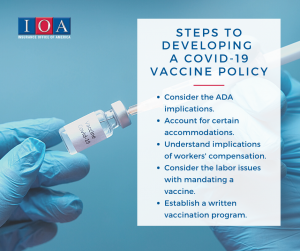The global pandemic caused business owners to reexamine their risk as it pertains to a return to physical proximity. As the vaccine continued to roll out, employees were being asked to and in some cases required to return to the office and manufacturing location. As an employer, it is essential that you understand what factors may put you at risk of litigation, employee health hazards, OSHA non-compliance, and other risks as you navigate the COVID landscape and prepare for the future.
Here are steps to help you prepare for what’s to come.
Can employers mandate the COVID-19 vaccine?
In short, yes. However, this is circumstantial. The Equal Employment Opportunity Commission (EEOC) released recent guidelines that explain that, under the Americans with Disabilities Act (ADA), an employer is allowed to mandate the vaccine if a worker poses a “direct threat” to themselves or others.
An important question to ask is whether or not an unvaccinated person would expose others to the virus at the workplace. A “direct threat” is defined as someone who poses a “significant risk of substantial harm to the health or safety of the individual or others that cannot be eliminated or reduced by reasonable accommodation.” So, for example, if your company will remain remote for the foreseeable future, your employees cannot be mandated to get the vaccine.
What steps can I take to prepare my workforce?
Start by ensuring coverage for the cost of federally approved vaccines.
Federal law requires group health plans to provide coverage that includes the cost of the vaccine, administration cost, and the employee’s doctor’s (or clinic) office visit. It’s important that your plan sponsors confirm with the medical insurance carrier that they are administering the proper coverage for the vaccine.
Develop a vaccine policy.
As a business owner, you can choose whether you will be simply communicating the importance of getting vaccinated, providing incentives for vaccinations, or mandating the vaccine. When crafting this plan it’s important to understand the ADA implications, specific accommodations, workers’ compensation, OSHA requirements, state and local laws, labor issues, the cost, and a written program.
ADA implications
- The EEOC tells business owners to be wary of performing pre-screening questions on their own as it may elicit information regarding a disability, which would implicate the ADA’s provision.
- If you mandate and administer the vaccine you must show that prescreening questions are job-related and consistent with business necessity.
- If you decide to implement a mandatory vaccination program, it’s important that you use a third-party that does not have a contract with the employer to administer the vaccine and handle the prescreening questions OR you can make the vaccination program voluntary, ensuring the prescreening questions are voluntary.
Accommodations
- Accommodations may be necessary to help reduce the direct threat without undue hardship.
- It’s important to make an individual assessment of each accommodation you may have to make. You should consider the duration of the risk, the nature and severity of the potential harm, the likelihood the harm will occur, and the imminence of the harm.
- This EEOC warns that if an employee refuses the vaccine it is temporary and should not mean automatic termination. Work to make additional accommodations, like remote work or a leave of absence.
- The vaccine is not approved for use in pregnant women. It’s important to provide accommodations for those who object until they can be vaccinated.
- Those who hold religious beliefs that prevent them from being vaccinated should also be accommodated unless it would pose an undue hardship or additional burden to the employer.
Workers’ Compensation
- If you require employees to receive the vaccine, and an employee who was vaccinated is injured as a result of the adverse reactions, they may have a workers’ compensation claim on their hands
Labor issues
- If employees are unionized the onset of a mandatory vaccination program may be a subject of bargaining.
- For those not unionized, the collective refusal of vaccination may qualify as a “protected concerted activity”
Establish a written vaccination program
- Ensure your written vaccination program is compliant with federal, state, and local regulations. It should also include clear policies for an accommodation process.
There are a few issues when it comes to mandating a vaccination policy within your workforce. For one, can you meet the “direct threat” standard for every job classification if all employees are required to receive it? If your employees refuse to be vaccinated you may want to consider the following options:
Will you terminate all employees who refuse to be vaccinated if they do not have an objection under Title IV? It is crucial that all those who refuse are treated the same, as any variance made lead to discrimination claims.
What happens if an employee has an adverse reaction to the first dose? Will you still require other employees to receive the vaccine? Will you require that employee to get the second dose?
It’s important that you consider all the potential hurdles to mandating vaccines for your employees.
Connect With Us Today
Communicate your COVID plan with your employees.
Employee reluctance to receiving the vaccine, and being mandated to do so, is concerning for most employers. Because of this, you should develop a plan to effectively communicate your strategy to employees. Address religious concerns, fears, rumors and provide reliable resources such as the CDC website or video walkthroughs of the science behind the development of the vaccine as a resource. Consider bringing a medical professional in for a Q&A session to relieve fears and misinformation.
Direct your workforce on vaccine updates.
Finding vaccine updates and availability is essential to getting your team vaccinated. Employees should be aware of where vaccines are being made available, who is considered essential, who is administering the vaccine, how to sign up, and what is expected in the future.
Are there alternatives to mandating the COVID-19 vaccine?
One alternative that some employers are adopting educating employees on the facts about the vaccine. Question and answer sessions and providing vaccine updates via email and social media can be extremely helpful in encouraging participation.
Another alternative to consider is to encourage the workforce to choose to get the vaccine. This can be done through incentive programs, like wellness programs and bonus incentives. It’s important that these incentives do not discriminate against those who would otherwise qualify for an ADA or Title VII accommodation.
Navigating the terrain of the ‘new normal’ can be challenging. You need an expert to help you ensure you reduce your risks as you implement various protocols. Contact Roger today to see how he can help you develop a risk-reducing COVID plan for the future.


